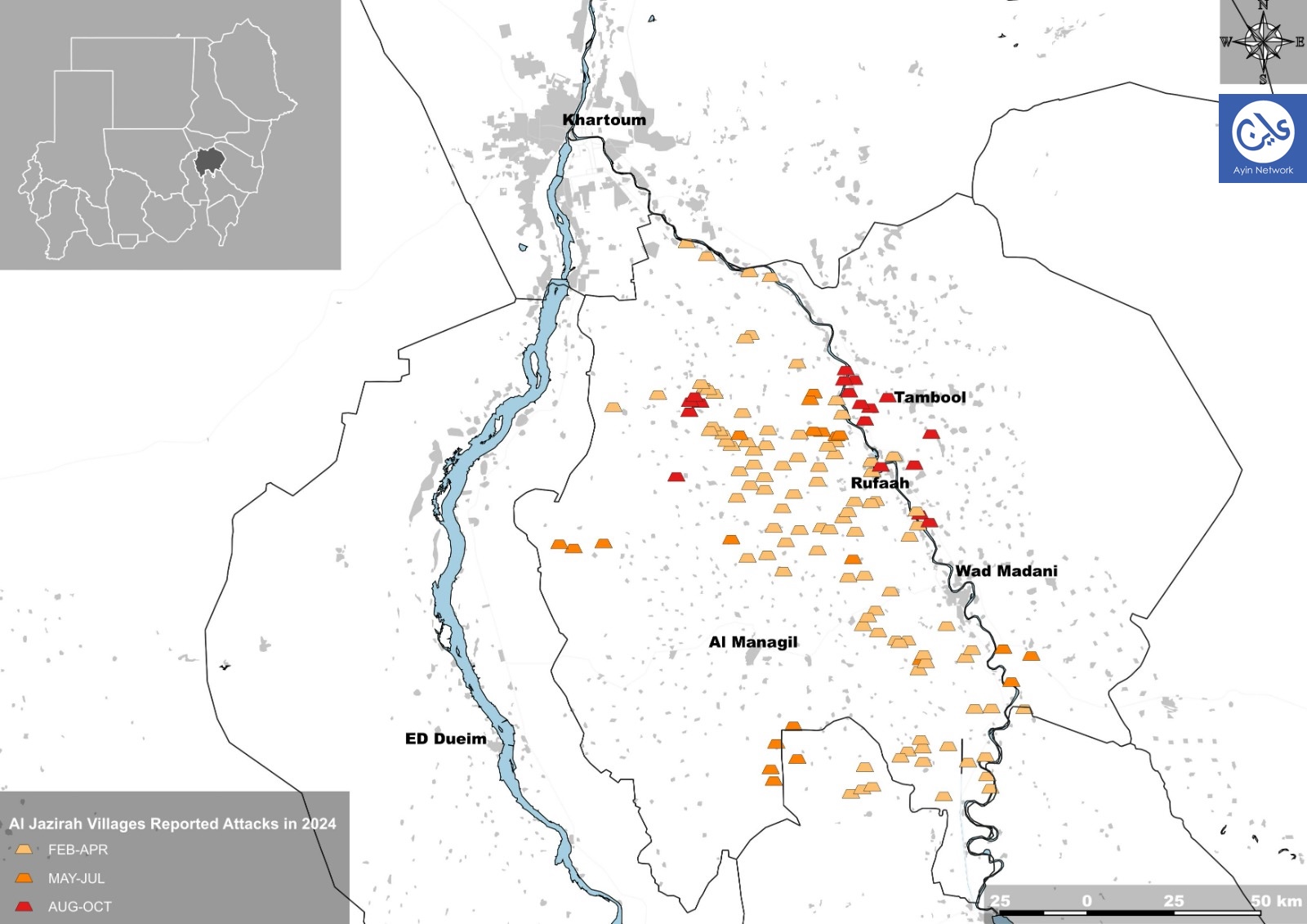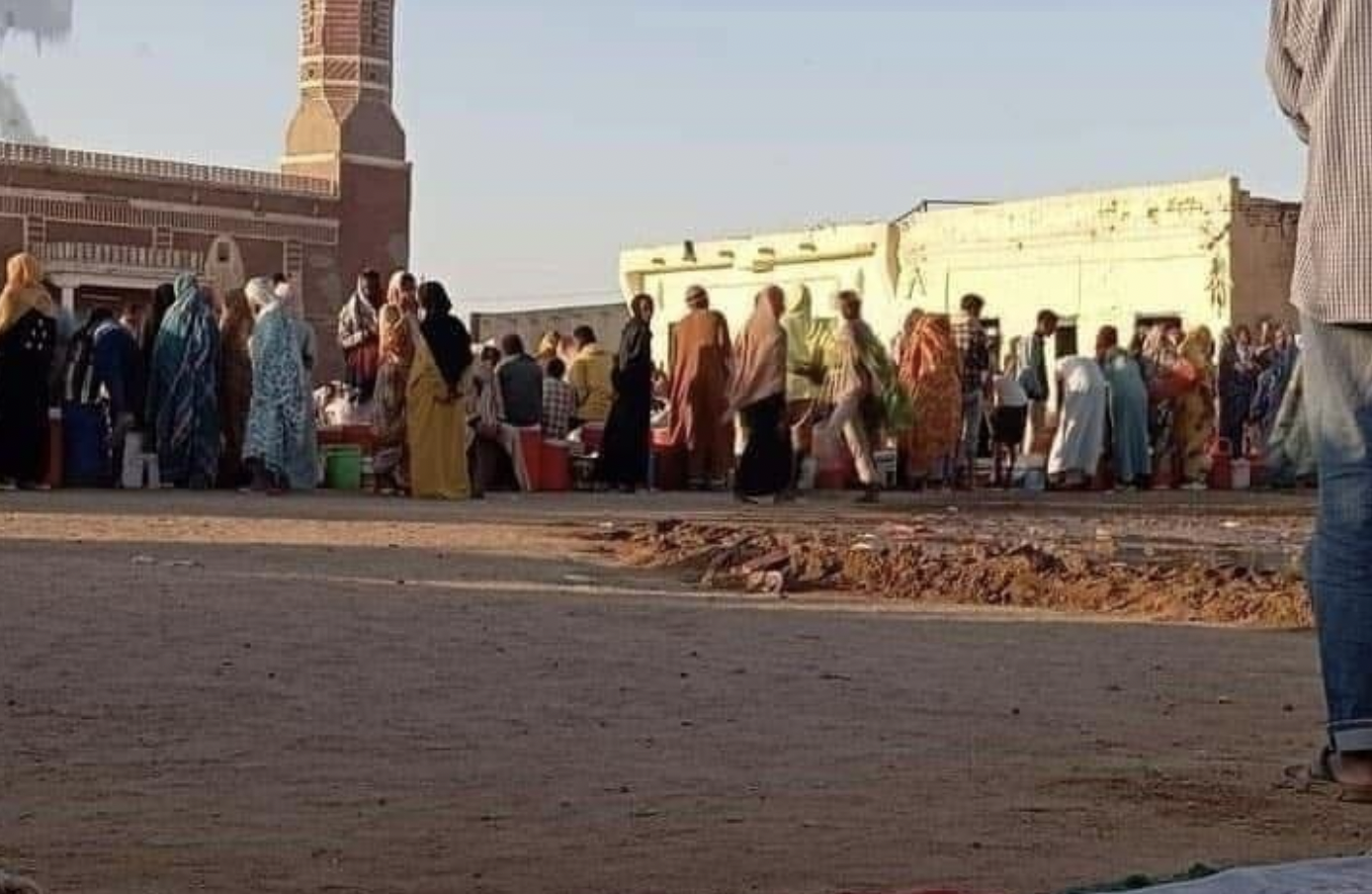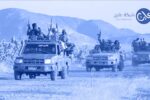Al-Jazeera: Over 130 villages invaded by RSF
19 November 2024
Since December last year, the paramilitary Rapid Support Forces (RSF) seized control of Al-Jazeera state, having invaded at least 137 villages and localities within the state, according to extensive research conducted by Ayin. In some of the locations cited above, the RSF and aligned militia have targeted the residents multiple times. This estimate identifies locations that Ayin could confirm through eyewitness accounts; the total figure of RSF attacks on localities in Al-Jazeera State is likely higher.
The state, a former breadbasket the size of Belgium or Albania, is home to hundreds of small farming villages, where RSF and aligned militias have killed, tortured, looted, and in some cases raped civilians. The majority of these attacks, 71% (97 cases), took place earlier in the year between February and April, 16% (22 cases) took place from May to July 2024, and 13% (18 villages) were attacked between August and October 2024.

Some of the worst violations
While the number of villages may have reduced since earlier in the year, the severity of the RSF attacks on residents constitutes some of the worst human rights violations in this conflict to date.
On 11 November, the Al-Jazeera conference, a local civil society human rights group, issued a statement reporting that the Rapid Support Forces (RSF) had killed 1,237 civilians in 21 days. Meanwhile, the independent Egyptian news site Mada Masr reported a slightly higher total of 1,245 civilian causalities. The breakdown of deadly attacks includes: 28 in Refaa, 27 in Wad Al-Sayed, 300 in Tambul, 57 in Oqda Tambul, 25 in Maknun, 140 in Al-Sariha, 450 in Hilaliya, and 21 in Ezeiba.
Al-Hilaliya reported the highest number of deaths, with reports indicating that the RSF has been besieging the village for weeks, preventing residents from leaving or accessing food and medicine. Social media claims that the RSF poisoned the water and food, leading to a cholera outbreak and the deaths of hundreds of civilians. In response, the U.S. special envoy to Sudan, Tom Perriello, condemned the actions: “To poison food in a country already suffering from famine is an especially heinous act.”
The International Organisation for Migration (IOM) stated that within a 24-day period, 343,437 individuals have fled the ongoing violence in Al-Jazeera state. Notably, at least 15,129 of these individuals have experienced displacement more than once since the conflict began.
The RSF did not respond to comment on this report before publishing. In a recent press conference, the paramilitary group said they were “fully committed to an immediate nationwide ceasefire, ensuring the passage of humanitarian aid, and creating safe corridors for civilians and aid workers.”

A war against civilians
Mohamed Osman, Sudan researcher at Human Rights Watch (HRW), underscores the fact that from the onset of the war, it was clear that the conflict was primarily targeting civilians, not simply a battle for power between Sudan’s army and the Rapid Support Forces. Osman believes that the violence against civilians escalated as the fighting intensified, with military objectives merging with civilian suffering. “Civilians are not safe anywhere in Sudan,” Osman told Ayin,
The latest attacks came after the defection of Abu Agla Kaikal, the leader of the North Shield militia. Kaikal announced at the beginning of the war that his forces would fight alongside the RSF against the SAF, and subsequently he was appointed as the RSF’s senior commander in Al-Jazeera state following their takeover. Before surrendering to the Sudanese Armed Forces (SAF), Kaikal was reportedly involved in an intelligence-led negotiation with SAF commanders. As part of the agreement, he was granted immunity following his defection.
The paramilitary Rapid Support Forces (RSF) took control of Al-Jazeera state following the withdrawal of the Sudanese Armed Forces (SAF) in December last year. This withdrawal, which remains unexplained, has left the state under RSF control. Despite SAF’s announcement of an investigation into the circumstances of their retreat, no findings have been released to the public to date. Currently, the RSF controls more than 90% of the state, with the exception of the Al-Managil locality and small villages nearby.
Families apart
Volunteers supporting the conflict affected in Al-Jazeera State have reported alarming numbers of missing persons following violent attacks by the Rapid Support Forces (RSF). In the village of Al-Buwayda alone, 108 people are unaccounted for. Similarly, dozens of people from other areas, such as Sariha, Tamboul, and neighbouring villages, remain missing, with women, children, and the elderly forming the majority of those affected, local sources told Ayin. Efforts to locate the missing have been hindered by a communication blackout across the state.
Adam Idris, a displaced person who fled eastern Al-Jazeera to Al-Sabbagh in El-Gedaref state, described the heartbreak his family endured after losing three children. “We lost three children, who are the sons and daughters of my brothers and sisters, and we are still searching for them. Our family is living in a state of psychological distress,” Idris told Ayin.
Despite harsh displacement conditions, including the lack of basic services and severe food shortages, the family’s primary focus remains on finding their missing children. “We are eagerly waiting for any news about them, and we’ve shared their photos on social media,” he said. Idris added that many displaced families who fled alongside him have lost loved ones, while others remain unsure if their family members survived the RSF attacks.
Social media initiatives have played a critical role in helping families to reunite with missing loved ones. These efforts involve sharing photos and information about those missing, along with contact details of their families, which have successfully located several individuals.
One such story of loss and reunion comes from Ahmed Abdel Qader, who endured four sleepless nights worrying about his missing 11-year-old son. The boy became separated from the family during their escape from Tamboul to Shendi in Nile River State. With the help of a social media campaign, Abdel Qader managed to locate his son after five gruelling days of searching.
“We were subjected to the most brutal attacks by the Rapid Support Forces (RSF), who looted, beat, and killed us,” Abdel Qader told Ayin. “We fled on foot; the intense violence scattered people, including us, and family members were separated. People took different paths to escape—it was in this scenario where we sadly lost our son.”
Ayin has previously reported on numerous RSF attacks against civilians and the atrocities committed by the paramilitary in areas such as Wad Al-Noura, Al Sariha, and other areas within the state. Ayin has also published an investigation into an incident of gang-rape and kidnapping attempts in Wad al-Noura, confirming the involvement of foreign mercenaries alongside the RSF in the attacks.


